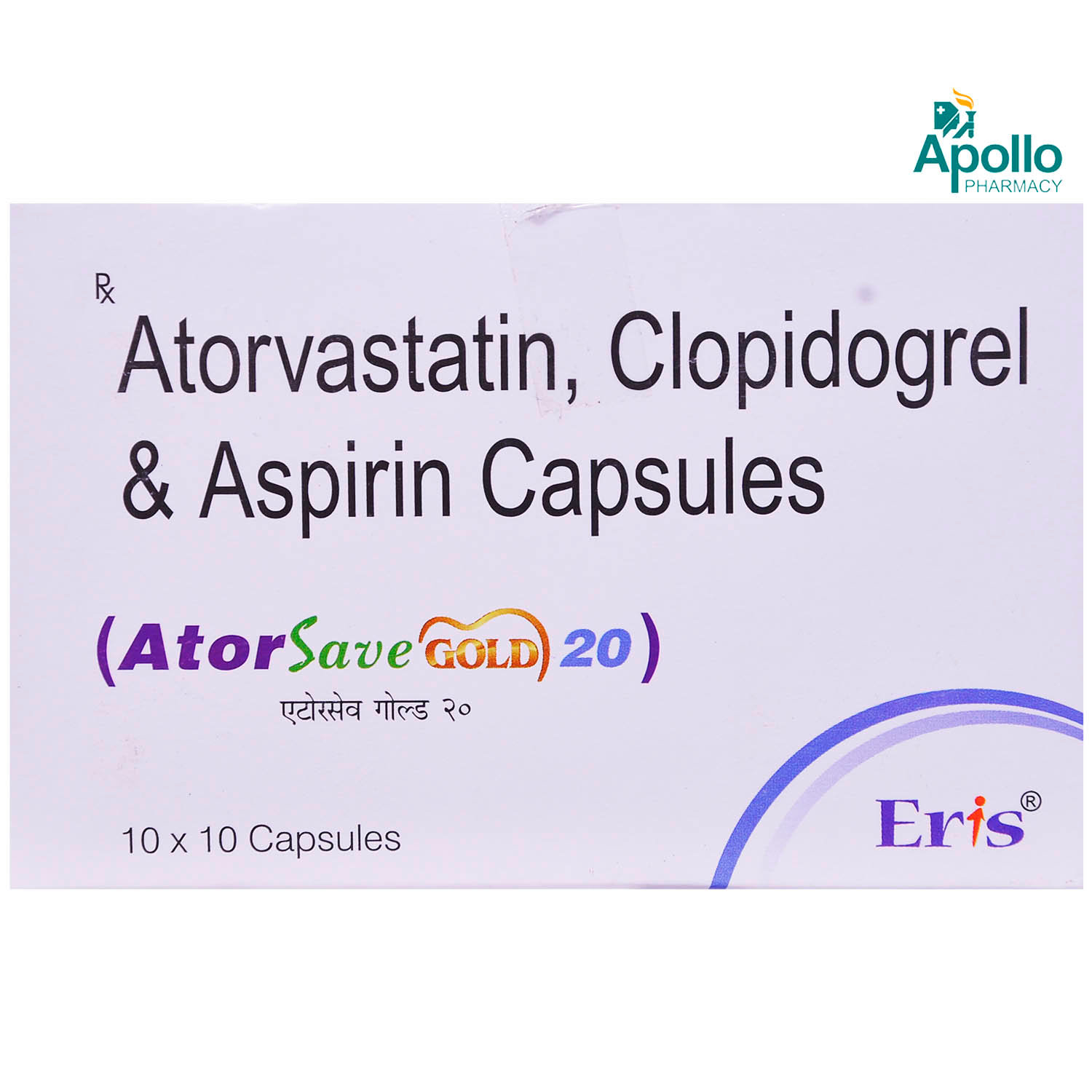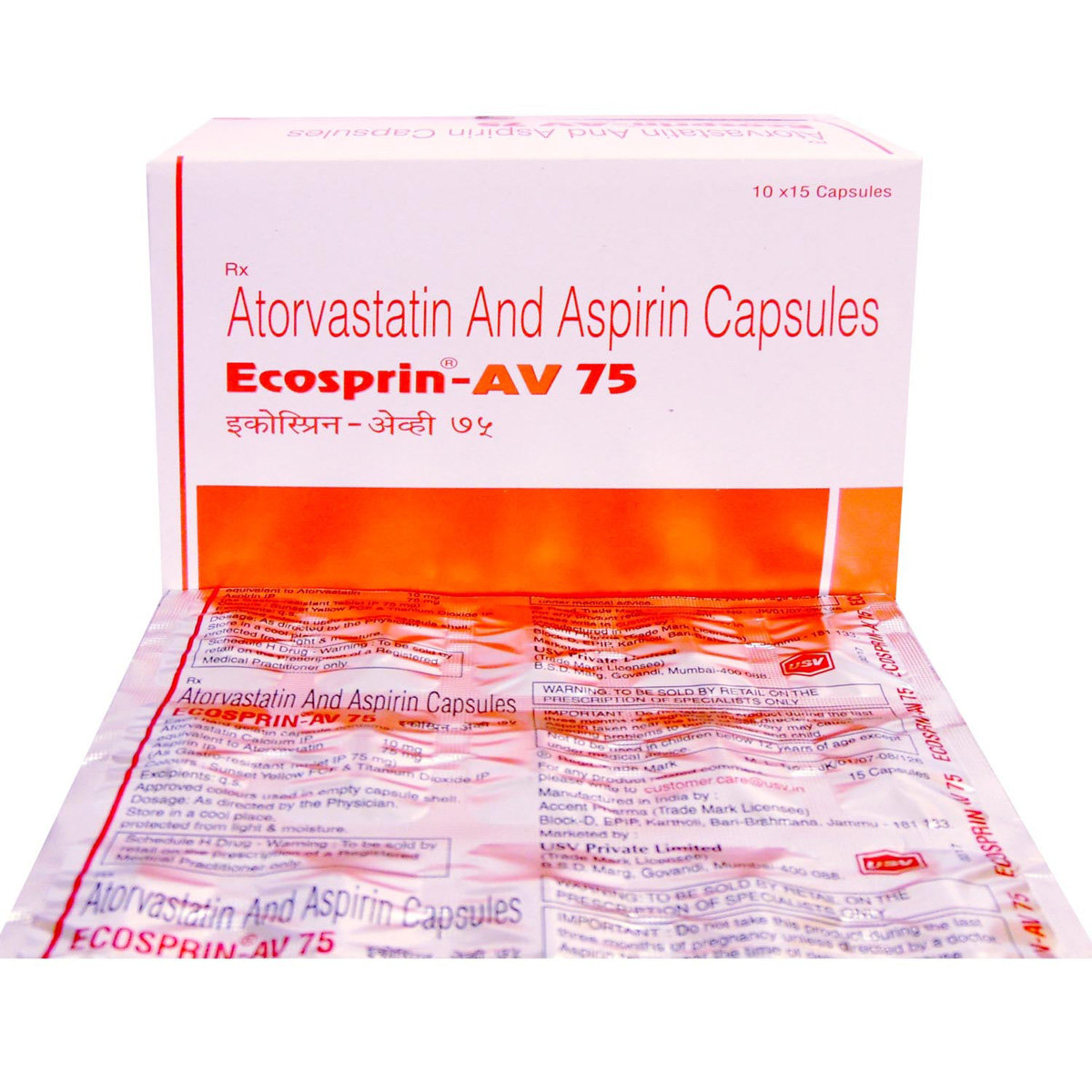Atorvastatin+aspirin
About Atorvastatin+aspirin
Atorvastatin+aspirin is a combination drug of blood-thinning agents and cholesterol-lowering agents, primarily taken for the prevention of heart attack and stroke. It also lowers the raised level of bad cholesterol (especially those who are at high risk of heart diseases). A heart attack generally refers to a blocked flow of blood to the heart due to the blockage of arteries. The blockage is most often a build-up of fat, cholesterol and other substances, which form a plaque in the arteries that feed the heart (coronary arteries).
Atorvastatin+aspirin is composed of two medicines namely: Atorvastatin and Aspirin. Atorvastatin is a lipid-lowering medication which blocks the enzyme required to make cholesterol in the body. It reduces the bad cholesterol (also known as low-density lipoproteins or LDL), and triglycerides (TG) and increases the levels of good cholesterol (also known as high-density lipoproteins or HDL). Aspirin is a blood thinner or anti-platelet (anticoagulant) that collectively prevent the formation of clot in the blood vessels. Together Atorvastatin+aspirin help to reduce the risk of heart attack, stroke, and heart-related chest pain (angina). Additionally, it is also given to the patients who had a recent heart bypass surgery (CABG) to control the level of cholesterol and prevent blood clots.
Your doctor will advise you on how often you take your tablets based on your medical condition. In some cases, you may experience headache, ankle swelling (oedema), dark urine, muscle weakness, slow heart rate, dizziness, and nausea. Most of these side effects of Atorvastatin+aspirin do not require medical attention and gradually resolve over time. However, if the side effects are persistent, reach out to your doctor.
Try not to stop taking this medicine of your own. Stopping Atorvastatin+aspirin abruptly may worsen your condition and increase your risk of future heart attack. Let your doctor know if are sensitive to atorvastatin, or aspirin, have any active liver disease, active bleeding issues (like peptic ulcer, brain haemorrhage), muscle problems (myopathy, rhabdomyolysis), are pregnant or planning to become pregnant or breastfeeding. Patients should inform the doctor that they are taking Atorvastatin+aspirin before any surgery is scheduled or any new medicine is taken. Atorvastatin present in Atorvastatin+aspirin is a pregnancy category X drug so it is contraindicated in pregnant women. As it may cause harm to the fetus if administered to a pregnant woman. Inform your doctor that you are taking Atorvastatin+aspirin if you are going to have any surgery.
Uses of Atorvastatin+aspirin
Medicinal Benefits
Atorvastatin+aspirin is composed of two medicines: Atorvastatin and Aspirin. Atorvastatin is a lipid-lowering medication and it blocks the enzyme required to make cholesterol in the body. It reduces the bad cholesterol (low density lipoproteins or LDL), triglycerides (TG) and increases the levels of good cholesterol (high density lipoproteins or HDL). Besides this, Aspirin prevents the formation of clot in the blood vessels. Together Atorvastatin+aspirin prevents risk of any heart attack or stroke in future.
Directions for Use
Storage
Side Effects of Atorvastatin+aspirin
- Headache
- Ankle swelling (oedema)
- Dark urine
- Muscle weakness
- Slow heart rate
- Dizziness
- Nausea
Drug Warnings
Let your doctor know if you are highly sensitive to atorvastatin, or aspirin, have any active liver disease, active bleeding issues (like peptic ulcer, brain haemorrhage), pregnant or planning to become pregnant, or breastfeeding. The patient should inform the doctor that they are taking Atorvastatin+aspirin before any surgery is scheduled or any new medicine is taken. Atorvastatin present in Atorvastatin+aspirin is a pregnancy category X drug so it is contraindicated in pregnant women. Atorvastatin+aspirin contains Atorvastatin which can cause muscle problems like myopathy and rhabdomyolysis. So, any signs of muscle pain, tenderness, or weakness, during the initial months of the treatment should be closely monitored. Safety and effectiveness of Atorvastatin+aspirin have not been established, so its use should be avoided in paediatric patients or children less than 12 years of age. Abrupt discontinuation of Atorvastatin+aspirin may lead to the occurrence of cardiovascular events like heart attack, stroke, and angina (heart-related chest pain). Hence, you should consult a doctor before stopping the dose of Atorvastatin+aspirin.
Drug Interactions
Drug-Drug Interaction: Atorvastatin+aspirin may interact with antibiotics (clarithromycin), anti-HIV drugs (ritonavir, lopinavir, darunavir, atazanavir, indinavir) and antifungal (itraconazole), blood thinners (warfarin, heparin), anti-arthritis drug (colchicine), heart-related medicine (digoxin), and immune system affecting drug (cyclosporine).
Drug-Food Interaction: Alcoholic beverages and grapefruit or its juice intake should be avoided with Atorvastatin+aspirin as it may interact with Atorvastatin+aspirin to produce unpleasant side effects.
Drug-Disease Interaction: Atorvastatin+aspirin should not be given to the patients with active liver disease, active bleeding issues (like peptic ulcer, brain haemorrhage), muscle problems or musculoskeletal problems (myopathy, rhabdomyolysis), asthma, and purpura (blood leakage under the skin).
Drug-Drug Interactions Checker List:
Safety Advice

Alcohol
unsafeAtorvastatin+aspirin should not be taken until prescribed if you are taking alcohol. Keep your doctor informed if you drink alcohol. Drinking alcohol with Atorvastatin+aspirin may potentiate gastric or stomach bleeding and ulcer symptoms. So, try to avoid or limit consumption of alcoholic beverages while using Atorvastatin+aspirin.

Pregnancy
unsafeAtorvastatin+aspirin contains Atorvastatin which is a pregnancy category X medicine. So, it is not recommended for the pregnant mother, or those who are planning to get pregnant. In an extreme case, your doctor will decide whether Atorvastatin+aspirin can be given or not.

Breast Feeding
cautionTake Atorvastatin+aspirin only when prescribed, as it is known to pass on in a limited quantity via breast milk to the child. Contact your doctor before using Atorvastatin+aspirin.

Driving
cautionDrive with caution as, Atorvastatin+aspirin can cause blurry vision and may affect your driving ability.

Liver
cautionAtorvastatin+aspirin to be taken with caution, especially if you have a history of liver diseases/conditions. Dose can be adjusted by your doctor.

Kidney
safe if prescribedAtorvastatin+aspirin to be taken with caution, especially if you have a history of kidney diseases/conditions. Dose may have to be adjusted by your doctor.

Children
cautionAtorvastatin+aspirin is not recommended for children below the age of 16 years. The safety and effectivenss of Atorvastatin+aspirin has not been established in children due to limited testing of this drug on children by competent authorities across the world.
Habit Forming
Diet & Lifestyle Advise
- Eat a healthy diet especially rich in soluble fibre like beans, legumes, whole grain, flax, apples, and citrus fruits.
- Try to replace most of your saturated fats with unsaturated fats that can reduce total cholesterol and LDL cholesterol in a short span of time. Foods like avocados, olive oil, fatty fish, and nuts contain lots of heart-healthy unsaturated fats, so it’s beneficial to eat them regularly.
- Try to adopt a Mediterranean-style diet rich in olive oil, fruits, vegetables, nuts, whole grains, and fish, and low in red meat and most dairy.
- Try to give priority to more fruits and veggies in your daily meal as these contain antioxidants which help to lower LDL - low density lipoprotein (bad cholesterol)
- Minimize the intake of added sugar. The American Heart Association (ADA) recommends, one should not eat more than 100 calories (25 grams) of added sugar for women and childraen, and no more than 150 calories (37.5 grams) for men every day.
- American Heart Association recommends the intake of sodium chloride (table salt) should not exceed more than 2,300 mg per day as part of a healthy eating pattern.
- As a precautionary measure, do not consume alcohol and quit smoking.
Patients Concern
Disease/Condition Glossary
Atherosclerosis occurs when fats, cholesterol and other substances known as plaque deposits on your artery walls that restrict blood flow. This plaque formation triggers blood clot, narrow the arteries size and makes it hardened. This in turn can lead to various heart complications like heart attack, heart-related chest pain (angina) and stroke. However, it can also affect the arteries of body apart from the heart.
FAQs
Yes, the use of Atorvastatin+aspirin can cause dizziness in some patients. They may experience symptoms such as feeling of fainting, weakness, or lightheadedness. In case you experience such symptoms, it is better to rest for some time until you feel better.
Usually Atorvastatin+aspirin is prescribed for a long term treatment ranging from weeks to months for treating heart-related conditions and disorders. However, taking it on your own for years without doctor's consent can be fatal. Hence, only take it as long as your doctor has prescribed it to you.
Yes, Atorvastatin+aspirin is known to cause upset stomach. So, it should be taken with food so as to avoid discomfort. If even then, problem persists, please consult your doctor for best advise. In rare cases gastro intestinal bleeding can be observed due to blood thinning action of aspirin present in Atorvastatin+aspirin.
There's no strong evidence to suggest that taking Atorvastatin+aspirin will reduce fertility in either men or women. However, it is advisable to consult a doctor before taking it if you're likely to get pregnant or pregnant.
Yoghurt has the ability to lower cholesterol to its probiotic content. Yoghurt eaters have a better metabolic profile than those who didn't eat yoghurt.
Atorvastatin+aspirin can raise your blood sugar (H1b1AC) a little. If you already have type 2 diabetes please consult your doctor. The doctor will weigh the benefits and any potential risks before prescribing it to you.
Atorvastatin+aspirin contains aspirin which can increased your risk of bleeding. Please consult your doctor if Atorvastatin+aspirin needs to be stopped before undergoing surgery. The doctor might ask you to stop taking Atorvastatin+aspirin few days before surgery to avoid the increased risk of bleeding during the procedure.
Yes, taking Atorvastatin+aspirin can increase the risk of bleeding as it contains aspirin which is a blood thinner. So, please be very caution while shaving, cutting fingernails or toenails, or using sharp objects to avoid any bleeding.
Prolonged intake of statins causes musculo skeletal problems or muscle weakness problems like myopathy and rhabdomyolysis. So, you can reach out to doctor if you have any muscle pain or weakness after taking Atorvastatin+aspirin.







